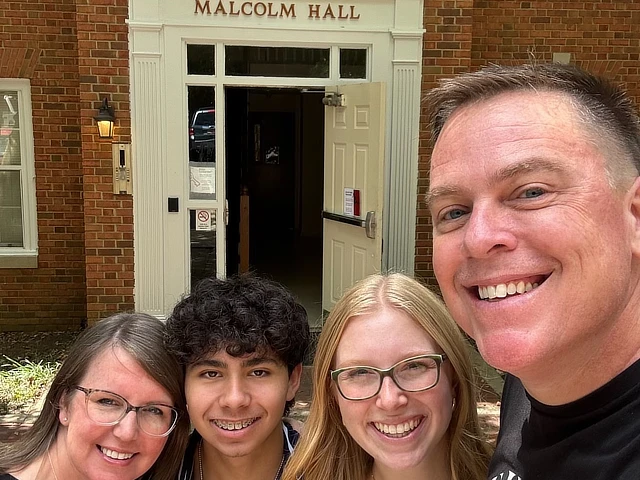
He established a testimony in Jacob and set up a law in Israel, which he commanded our ancestors to teach to their children so that a future generation—children yet to be born—might know. They were to rise and tell their children so that they might put their confidence in God and not forget God’s works but keep his commands. – Psalm 78:5-7 (CSB)
As Kelly and I visited college campuses with our daughter before she decided on Samford, we heard a recurring refrain among the university admissions counselors we met. Each made the point slightly differently, but the implication was the same: “Our professors and resident assistants primarily communicate with the students; we will not answer parent emails or return parent phone calls.” Incredulous, I couldn’t imagine my parents calling one of my college professors to complain about my grades (2.03 that first semester) or find out if I was behaving in the dorm (spoiler alert: I was not).
Yet, this is the reality today. Parents can’t help but “snowplow” every obstacle out of the way for their children—even after they are off at college. The twin devils of personal fear and social comparison fuel parents who can’t discern when and how to let their kids learn the hard but healthy lessons that only challenges—or failure—can teach. Therefore, they email, call, or even try to meet with college professors on behalf of their should-be-adult child. What those admissions counselors were “saying without saying it” is this: something needs to shift in your relationship with your child as they move off to college and into adulthood, and the practice of snowplow parenting will prevent this. Embrace this new season by beginning with who needs to hear your words (hint: not college employees) and when they need to hear them (another hint: not very quickly).
Once questioned and even despised in their teens, your words can now become a valued part of your child’s life throughout adulthood. You may even start to be considered wise! Your parenting role with adult children must shift from a consultant to a confidant, starting with the college years. A consultant engages in the moment with physical presence and asks great questions to stimulate the right thinking. A confidant listens in the moment with emotional support and encourages wise decision-making. This shift from consultant to confidant is natural and necessary for their growth, confidence, and independence. Who knows, you may even become (I hesitate to even dream about it) their friend.
Friendship may take years to develop during this season, but your role as confidant can begin immediately after driving away from campus. Remember, a confidant listens before speaking, empathizes before solving, and takes in deep thoughts and fears without judging or condemning. (Although, I’m convinced my parents laughed and high-fived their way through my 20s and 30s as Kelly and I made stupid mistakes and struggled to parent two very headstrong children.)
It may be helpful to lean into the concept of being a sounding board for your children in this collegiate season, helping them by reflecting and amplifying their decisions. Every big decision they make must become their voice through yours now, instead of your voice through theirs as it was in high school. In this season, you’re there to give advice but not to make the decision. (My Samford kid will try to charm or trick me into making a hard decision for her... and a couple of times, it has worked.) Do your best to take on the role of confidant and be a great listener to ultimately help them develop and take ownership of a personal standard of right living as a follower of Jesus. Your role in this transition is crucial, and your influence is significant.
Parenting your children through adulthood is ultimately a journey of faith multiplication that branches out across generations. As your children have children, your role as a confidant affords you the joy of walking alongside, listening, and advising. The temptation in this season of parenting adult children may be to over-inundate, talking more than you listen. Make it a practice to listen first, letting them pursue a life purpose of their own discovery, and providing perspective and support through the highs and lows that are inevitable in this life. Remember, this is a season of joy and fulfillment as you witness the growth and development of your children into independent, confident adults.
Whether you’ve just dropped your first child off for the first time or your last child off for the last time, resist the urge to clear the obstacles from their path and resign yourself to walking alongside them in this journey. Be the friend and confidant they need you to be, not the trainer and consultant you’re accustomed to being. And one day soon, when the shock wears off because they called to ask what you think about something, listen, encourage, support, and pray... then laugh at them after you hang up.
--
Bryan and Kelly Rose are from Murfreesboro, Tennessee, and are the parents of Macy, a junior at Samford, and Matthew, who is in 10th grade. The Roses serve on the Samford Parents Advisory Board and co-lead the Fellowship of Samford Parents in Ministry. Bryan encourages fathers and mothers through Family on Purpose, a group-based study designed to build strong families by equipping on-purpose parenting.
